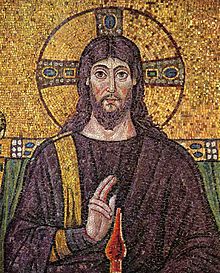- Christian atheism
-
Christian atheism is an ideology in which the belief in the god of Christianity is rejected or absent but the moral teachings of Jesus are followed. It is a belief that the stories of Jesus were meant to be related to in modern life but not taken literally.[citation needed] This belief is that the God of Christianity is nothing but a symbol.[citation needed]
Contents
Beliefs
Thomas Ogletree, Frederick Marquand Professor of Ethics and Religious Studies at Yale Divinity School, lists these four common beliefs:
- The assertion of the unreality of God for our age, including the understandings of God which have been a part of traditional Christian theology
- The insistence upon coming to grips with contemporary culture as a necessary feature of responsible theological work
- Varying degrees and forms of alienation from the church as it is now constituted
- Recognition of the centrality of the person of Jesus in theological reflection[1]
God's existence
According to Paul van Buren, a Death of God theologian, the word God itself is “either meaningless or misleading”.[1] He contends that it is impossible to think about God. Van Buren says that
“we cannot identify anything which will count for or against the truth of our statements concerning ‘God’”.[1]
Most Christian atheists believe that God never existed, but there are a few who believe in the death of God literally.[2] Thomas J. J. Altizer is a well known Christian atheist who is known for his literal approach to the death of God. He often speaks of God's death as a redemptive event. In his book The Gospel of Christian Atheism he speaks of how
“every man today who is open to experience knows that God is absent, but only the Christian knows that God is dead, that the death of God is a final and irrevocable event, and that God’s death has actualized in our history a new and liberated humanity”.[3]
Dealing with culture
Theologians including Altizer and Lyas looked at the scientific, empirical culture of today and tried to find religion’s place in it. In Altizer’s words,
“No longer can faith and the world exist in mutual isolation... the radical Christian condemns all forms of faith that are disengaged with the world”.[3]
He goes on to say that our response to atheism should be one of “acceptance and affirmation”.[3] Colin Lyas, a Philosophy lecturer at Lancaster University, stated that
“Christian atheists are united also in the belief that any satisfactory answer to these problems must be an answer that will make life tolerable in this world, here and now and which will direct attention to the social and other problems of this life”.[2]
Separation from the church
Altizer has said that
“the radical Christian... believes that the ecclesiastical tradition has ceased to be Christian”.[3]
He believed that orthodox Christianity no longer had any meaning to people because it did not discuss Christianity within the context of contemporary theology. Christian atheists want to be completely separated from most orthodox Christian beliefs and biblical traditions.[4] Altizer states that a faith will not be completely pure if it is open to modern culture. This faith “can never identify itself with an ecclesiastical tradition or with a given doctrinal or ritual form.” He goes on to say that faith cannot “have any final assurance as to what it means to be a Christian”.[3] Altizer said, “We must not, he says, seek for the sacred by saying ‘no’ to the radical profanity of our age, but by saying ‘yes’ to it”.[4] They see religions which withdraw from the world as moving away from truth. This is part of the reason why they see the existence of God as counter progressive. Altizer wrote of God as the enemy to man because mankind could never reach its fullest potential while God existed.[3] He went on to state that “to cling to the Christian God in our time is to evade the human situation of our century and to renounce the inevitable suffering which is its lot”.[3]
The centrality of Jesus
Jesus, although not seen as divine, is still a central feature of Christian atheism. Most Christian atheists think of Jesus as a wise and good man, accepting his moral teachings but rejecting the idea of his divinity. Hamilton said that to the Christian atheist, Jesus is not really the foundation of faith; instead he is a “place to be, a standpoint”.[4] Christian atheists look to Jesus as an example of what a Christian should be, but they do not see him as a god.
Hamilton wrote that following Jesus means being “alongside the neighbor, being for him”,[4] and that to follow Jesus means to be human, to help other humans, and to further mankind.
By denomination
Protestantism
In the Protestant Church in the Netherlands (PKN) and several other smaller denominations of the Netherlands, 1 in 6 clergy are either agnostic or atheist.[5] A reverend of the PKN, Klaas Hendrikse has described God as "a word for experience, or human experience" and said that Jesus may have never existed.[5]
Roman Catholic
Catholic atheism is a belief in which the culture, traditions, rituals and norms of Catholicism are accepted but the idea of the existence of God is rejected.
See also
- Asimov's Guide to the Bible
- Christian radicalism
- Cultural Christian
- Death of God Theology
- Don Cupitt
- Jefferson Bible
- Jesuism
- Nontheist Friends
- Nontheistic religions
- Robert Jensen
- Robert M. Price
- Thorkild Grosbøll
References
- ^ a b c Ogletree, Thomas W. The Death of God Controversy. New York: Abingdon Press, 1966.
- ^ a b Lyas, Colin. "On the Coherence of Christian Atheism." The Journal of the Royal Institute of Philosophy 45(171): 1970.
- ^ a b c d e f g Altizer, Thomas J. J. The Gospel of Christian atheism. Philadelphia: The Westminster Press, 1966.
- ^ a b c d Altizer, Thomas J. J. and William Hamilton. Radical Theology and The Death of God. New York: The Bobbs-Merrill Company, Inc.,1966.
- ^ a b Pigott, Robert (5 August 2011). "Dutch rethink Christianity for a doubtful world". BBC News. http://www.bbc.co.uk/news/world-europe-14417362. Retrieved 2 October 2011.
Further reading
- Soury, M. Joles (1910). Un athée catholique. E. Vitte. ASIN B001BQPY7G.
- Altizer, Thomas J. J. (2002). The New Gospel of Christian Atheism. The Davies Group. ISBN 1888570652.
- Hamilton, William, "A Quest for the Post-Historical Jesus," (London, New York: Continuum International Publishing Group, 1994). ISBN 978-0826406415
External links
Categories:- Atheism
- Christian interfaith and secular relations
- Death of God theology
- Christian theological movements
Wikimedia Foundation. 2010.

![The Greek word "atheoi" ("[those who are] without God") as it appears on the early 3rd-century Papyrus 46](/pictures/enwiki/50/200px-Ephesians_2%2C12_-_Greek_atheos.jpg)

